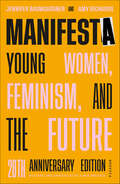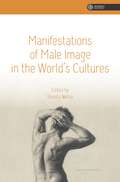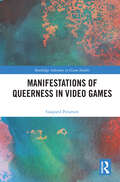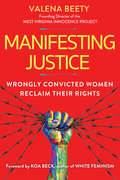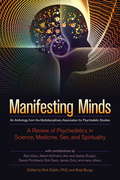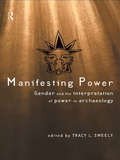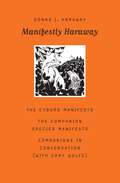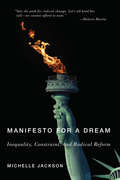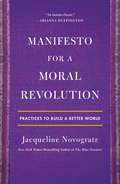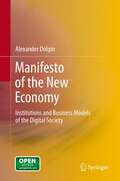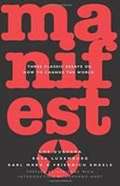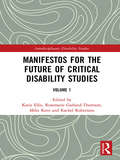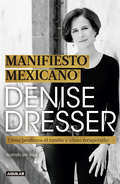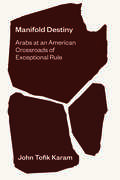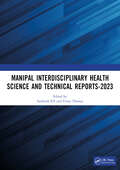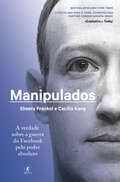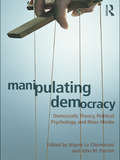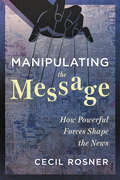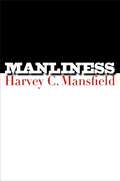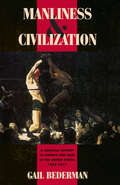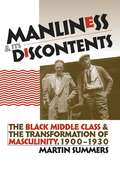- Table View
- List View
Manifesta: Young Women, Feminism, and the Future
by Jennifer Baumgardner Amy RichardsJennifer Baumgardner and Amy Richards, themselves young feminists, provide an overview of feminism today and describe how it is still relevant in the lives of young women. Offers suggestions on how individuals can get involved in affecting positive change in their homes, their communities, on campuses, and all over the world. Richards and Baumgardner express a hope that feminists of all generations can learn to listen to one another and work together. The book authors insightful reflections on topics such as activism, the media, women's history, the Equal Rights Amendment, mothers, reaching out to teens, feminist books and magazines, diversity, and more. Conveys the message that, while feminism is often perceived as something negative, girls in the "Third Wave" of the women's movement are redefining it into something that a woman can be proud of. This book was written when the authors were in their late twenties. Amy Richards is a contributing editor at Ms. and heads the Third Wave, an activist group for young women. Jennifer Baumgardner is a former editor at Ms. and writes regularly for The Nation, Jane, Glamour, and Out.
Manifesta: Young Women, Feminism, and the Future
by Jennifer Baumgardner Amy RichardsThe twentieth anniversary release of a groundbreaking feminist text: a powerful indictment of the current state of feminism, and a passionate call to armsToday, people of all genders strive to uphold the goals of feminism and proudly embrace the term, but the movement itself is often beset with confusion and questions. Does personal empowerment happen at the expense of politics? Is feminism for the few—or does it speak to the many as they bump up against daily injustices? What does it mean to say "the future is female"?In 2000, Jennifer Baumgardner and Amy Richards’s Manifesta set out to chronicle the feminism of their generation. They brilliantly revealed the snags in various hubs of the movement—from antipathy to the term itself to the hyped hatred of feminism’s imperfect spokespeople—and showed that these snags had not imperiled the feminist cause. The book went on to inspire a new generation of readers and has become a classic of contemporary feminist literature.In the decades since Manifesta was published, the world has changed in ways both promising and terrifying. This twentieth anniversary edition of Manifesta features an updated bibliography, timeline, and resources, as well as a new introduction by the authors. Expertly unpacking both early women’s history and the Third Wave feminism that seeded the active righteous intersectionality we see today, Manifesta remains an urgent and necessary tool to make sense of our past, present, and future.
Manifestations of Male Image in the World’s Cultures (The Vastness of Culture)
by Renata IwickaManifestations of Male Image in the World’s Cultures shows a single cultural phenomenon from a number of diverse perspectives. Methods used to analyze the titular male image range from Literary Studies and Cultural Studies to Media Studies. Thanks to the Authors’ broad experience in various fields of academic research, the volume presents this highly layered theme in a truly interdisciplinary way. I perceive the multiauthored – and therefore “polyphonic” – collection as a truly original attempt to build a framework of humanistic thought that is based on clear theoretical and methodological criteria. Moreover, its open character allows the use and merging of a number of humanistic methods, such as the aforementioned Literary or Cultural Studies, with other inspirations that, layer by layer, add the depth and provide further insight into the relationship between the male image and broadly understood cultural practices.
Manifestations of Queerness in Video Games (Routledge Advances in Game Studies)
by Gaspard PelursonTaking the reader on a journey through queer manifestations in games, this book advocates for video games as a rich, political and cultural medium, which provides us with tools to navigate the future of gaming. Situated at the intersection of New Media, Game, Cultural and Queer Studies, the book navigates diverse interspecies relationships, queer villains from the past, Pokémon memes on border politics, flânerie in post-industrial cities and one-sided erotic fights. It provides new critical engagements with the works of Jose Esteban Muñoz, Bonnie Ruberg, Guy Debord and Jack Halberstam, examining queer representation, gaming subcultures and dissident play practices. Making the bold claim that video games might be the queerest medium today, this book provides organic, self-reflective and, ultimately, thought-provoking thinking in which both games and gamers are queered. This book will be of interest to scholars researching game studies, sex, gender and sexuality in new media, but also readers interested in literature, digital media, society, participatory culture and queer studies.
Manifesting Justice: Wrongly Convicted Women Reclaim Their Rights
by Valena Beety&“Just as the Black Lives Matter movement and recent protests have shown the leadership of women of color in organizing against the prison state, this book will show the leadership of women, which is too often ignored, in the innocence movement.&” —Aya Gruber, Professor of Law, University of Colorado Law School, author of The Feminist War on CrimeThrough the lens of her work with the Innocence Movement and her client Leigh Stubbs—a woman denied a fair trial in 2000 largely due to her sexual orientation—innocence litigator, activist, and founder of the West Virginia Innocence Project Valena Beety examines the failures in America&’s criminal legal system and the reforms necessary to eliminate wrongful convictions—particularly with regards to women, the queer community, and people of color… When Valena Beety first became a federal prosecutor, her goal was to protect victims, especially women, from cycles of violence. What she discovered was that not only did prosecutions often fail to help victims, they frequently relied on false information, forensic fraud, and police and prosecutor misconduct. Seeking change, Beety began working in the Innocence Movement, helping to free factually innocent people through DNA testing and criminal justice reform. Manifesting Justice focuses on the shocking story of Beety&’s client Leigh Stubbs—a young, queer woman in Mississippi, convicted of a horrific crime she did not commit because of her sexual orientation. Beety weaves Stubbs&’s harrowing narrative through the broader story of a broken criminal justice system where defendants—including disproportionate numbers of women of color and queer individuals—are convicted due to racism, prejudice, coerced confessions, and false identifications. Drawing on interviews with both innocence advocates and wrongfully convicted women, along with Beety&’s own experiences as an expert litigator and a queer woman, Manifesting Justice provides a unique outsider/insider perspective. Beety expands our notion of justice to include not just people who are factually innocent, but those who are over-charged, pressured into bad plea deals, and over-sentenced. The result is a riveting and timely book that not only advocates for reforming the conviction process—it will transform our very ideas of crime and punishment, what innocence is, and who should be free. With a Foreword by Koa Beck, author of White Feminism
Manifesting Minds
by Rick Doblin Brad BurgeFeaturing essays and interviews with Timothy Leary, Aldous Huxley, Ram Dass, Albert Hofmann, Alexander (Sasha) Shulgin, Daniel Pinchbeck, Tim Robbins, Arne Naess, and electronic musician Simon Posford, as well as groundbreaking research and personal accounts, this one-of-a-kind anthology is a "best of" collection of articles and essays published by the Multidisciplinary Association for Psychedelic Studies (MAPS). Topics include the healing use of marijuana and psychedelics--including MDMA, ibogaine, LSD, and ayahuasca--for PTSD, anxiety, depression, and drug addiction, as well as positive effects of these substances in the realm of the arts, family, spirituality, ecology, and technology. Among many other thought-provoking and mind-opening pieces are the following:* "On Leary and Drugs at the End," by Carol Rosen and Vicki Marshall * "Psychedelic Rites of Passage," by Ram Dass * "To Be Read at the Funeral," by Albert Hofmann * "Another Green World: Psychedelics and Ecology," by Daniel Pinchbeck * "Psychedelics and Species Connectedness," by Stanley Krippner, PhD * "Huxley on Drugs and Creativity," by Aldous Huxley* "Psychedelics and the Deep Ecology Movement: A Conversation with Arne Naess," by Mark A. Schroll, PhD, and David Rothenberg * "Psychedelic Sensibility," by Tom Robbins * "Electronic Music and Psychedelics: An Interview with Simon Posford of Shpongle," by David Jay Brown * "How Psychedelics Informed My Sex Life and Sex Work," by Annie Sprinkle* "Consideration of Ayahuasca for the Treatment of Posttraumatic Stress Disorder," by Jessica Nielson, PhD, and Julie Megler, MSN, NP-BC * "Psychedelics and Extreme Sports," by James Oroc * "Youth and Entheogens: A Modern Rite of Passage?," by Andrei Foldes with Amba, Eric Johnson, et al. * "Diary of an MDMA Subject," by Anonymous* "Dimethyltryptamine: Possible Endogenous Ligand of the Sigma-1 Receptor?," by Adam L. Halberstadt * "Lessons from Psychedelic Therapy," by Richard Yensen, PhD * "Psychosomatic Medicine, Psychoneuroimmunology, and Psychedelics," by Ana Maqueda * "Talking with Ann and Sasha Shulgin about the Existence of God and the Pleasures of Sex and Drugs," by Jon Hanna and Silvia ThyssenFrom the Trade Paperback edition.
Manifesting Power: Gender and the Interpretation of Power in Archaeology
by Tracy L. SweelyPower relations among humans have likely been a topic of interest since long before any historical claims to its nature were proffered. This book recognizes that power and gender may be rooted in the experience of power in western society.
Manifestly Haraway (Posthumanities #37)
by Donna J. HarawayElectrifying, provocative, and controversial when first published thirty years ago, Donna Haraway&’s &“Cyborg Manifesto&” is even more relevant today, when the divisions that she so eloquently challenges—of human and machine but also of gender, class, race, ethnicity, sexuality, and location—are increasingly complex. The subsequent &“Companion Species Manifesto,&” which further questions the human–nonhuman disjunction, is no less urgently needed in our time of environmental crisis and profound polarization.Manifestly Haraway brings together these momentous manifestos to expose the continuity and ramifying force of Haraway&’s thought, whose significance emerges with engaging immediacy in a sustained conversation between the author and her long-term friend and colleague Cary Wolfe. Reading cyborgs and companion species through and with each other, Haraway and Wolfe join in a wide-ranging exchange on the history and meaning of the manifestos in the context of biopolitics, feminism, Marxism, human–nonhuman relationships, making kin, literary tropes, material semiotics, the negative way of knowing, secular Catholicism, and more.The conversation ends by revealing the early stages of Haraway&’s &“Chthulucene Manifesto,&” in tension with the teleologies of the doleful Anthropocene and the exterminationist Capitalocene. Deeply dedicated to a diverse and robust earthly flourishing, Manifestly Haraway promises to reignite needed discussion in and out of the academy about biologies, technologies, histories, and still possible futures.
Manifesto for Another World: Voices from Beyond the Dark (Open Media Series)
by Ariel DorfmanIn this interlocking prose web of first-person testimony, novelist, poet, and playwright Ariel Dorfman relates the struggles of fifty human rights activists hailing from more than forty countries. Manifesto for Another World features the words and struggles of internationally celebrated activists including Vaclav Havel, Baltasar Garzón, Helen Prejean, and Marian Wright Edelman; and Nobel Prize Laureates the Dalai Lama, Desmond Tutu, Elie Wiesel, Oscar Arias Sánchez, Rigoberta Menchú Tum, José Ramos-Horta, and Bobby Muller. Equally moving are the stories of more than thirty others, unknown and (as yet) unsung beyond their national boundaries: Kailash Satyarthi, who has spent a lifetime working to free tens of thousands of victims of child labor in his native India, and Juliana Dogbadzi, who was sold into sexual slavery by her parents at age twelve, escaped after seventeen degrading years, and now is devoted to the liberation of African girls bound in the same terror. From their ranging voices Dorfman culls the message: freedom from persecution, and freedom of opportunity, for all. Manifesto for Another World is both a political testament and a work of art.
Manifesto for a Dream: Inequality, Constraint, and Radical Reform (Inequalities)
by Michelle JacksonA searing critique of our contemporary policy agenda, and a call to implement radical change. Although it is well known that the United States has an inequality problem, the social science community has failed to mobilize in response. Social scientists have instead adopted a strikingly insipid approach to policy reform, an ostensibly science-based approach that offers incremental, narrow-gauge, and evidence-informed "interventions." This approach assumes that the best that we can do is to contain the problem. It is largely taken for granted that we will never solve it. In Manifesto for a Dream, Michelle Jackson asserts that we will never make strides toward equality if we do not start to think radically. It is the structure of social institutions that generates and maintains social inequality, and it is only by attacking that structure that progress can be made. Jackson makes a scientific case for large-scale institutional reform, drawing on examples from other countries to demonstrate that reforms that have been unthinkable in the United States are considered to be quite unproblematic in other contexts. She persuasively argues that an emboldened social science has an obligation to develop and test the radical policies that would be necessary for equality to be assured for all.
Manifesto for a Moral Revolution: Practices to Build a Better World
by Jacqueline NovogratzAn essential shortlist of leadership ideas for everyone who wants to do good in this world, from Jacqueline Novogratz, author of the New York Times bestseller The Blue Sweater and founder and CEO of Acumen. <p><p> In 2001, when Jacqueline Novogratz founded Acumen, a global community of socially and environmentally responsible partners dedicated to changing the way the world tackles poverty, few had heard of impact investing—Acumen’s practice of “doing well by doing good.” Nineteen years later, there’s been a seismic shift in how corporate boards and other stakeholders evaluate businesses: impact investment is not only morally defensible but now also economically advantageous, even necessary. <p> Still, it isn’t easy to reach a success that includes profits as well as mutually favorable relationships with workers and the communities in which they live. So how can today’s leaders, who often kick off their enterprises with high hopes and short timetables, navigate the challenges of poverty and war, of egos and impatience, which have stymied generations of investors who came before? <p> Drawing on inspiring stories from change-makers around the world and on memories of her own most difficult experiences, Jacqueline divulges the most common leadership mistakes and the mind-sets needed to rise above them. The culmination of thirty years of work developing sustainable solutions for the problems of the poor, Manifesto for a Moral Revolution offers the perspectives necessary for all those—whether ascending the corporate ladder or bringing solar light to rural villages—who seek to leave this world better off than they found it.
Manifesto of the New Economy: Institutions and Business Models of the Digital Society
by Alexander DolginThe book describes the main directions for the development of the digital society. The author angles its book to those who are interested to know what would replace search engines, and how social networks would evolve; what profit can be made of different forms of informational collaboration (crowdsourcing, collaborative filtering). And, the main thing, how it will influence the structure of the society and human pursuit for happiness. The author does not confine himself to a theory, he sets and solves practical questions: How talent, success and "stardom" are interconnected, how to make money in social networks, what is the business model for the development of entertainment and media, how to measure cultural values, and what is the subjective time of the individual and how to make it qualitative? There have been no answers to these questions before. Internet and social networks have provided tools and data that Alexander Dolgin was the first to use in economics.
Manifesto: Three Classic Essays on How to Change the World
by Friedrich Engels Karl Marx Ernesto Che Guevara Rosa Luxemburg"Let's be realists, let's dream the impossible." Che Guevara's words summarize the radical vision of the four famous rebels presented in this book: Marx and Engels' "Communist Manifesto," Rosa Luxemburg's "Reform or Revolution" and Che Guevara's "Socialism and Humanity." Far from being lifeless historical documents, these manifestos for revolution will resonate with a new generation also seeking a better world. "The world described by Marx and Engels... is recognizably the world we live in 150 years later.
Manifestos for the Future of Critical Disability Studies: Volume 1 (Interdisciplinary Disability Studies)
by Rosemarie Garland-Thomson Rachel Robertson Katie Ellis Mike KentThis collection identifies the key tensions and conflicts being debated within the field of critical disability studies and provides both an outline of the field in its current form and offers manifestos for its future direction. Traversing a number of disciplines from science and technology studies to maternal studies, the collection offers a transdisciplinary vision for the future of critical disability studies. Some common thematic concerns emerge across the book such as digital futures, the usefulness of anger, creativity, family as disability allies, intersectionality, ethics, eugenics, accessibility and interdisciplinarity. However, the contributors who write as either disabled people or allies do not proceed from a singular approach to disability, often reflecting different or even opposing positions on these issues. Containing contributions from established and new voices in disability studies outlining their own manifesto for the future of the field, this book will be of interest to all scholars and students working within the fields of disability studies, cultural studies, sociology, law, history and education. The concerns introduced here are further explored in its sister volume Interdisciplinary approaches to disability: looking towards the future.
Manifiesto mexicano: Cómo perdimos el rumbo y cómo recuperarlo
by Denise DresserUna lectura obligada para ciudadanos críticos y propositivos. Este es un libro lleno de rabia y amor perro por el México maltrecho que debemos rescatar. Es una crónica del hartazgo, del enojo con la cleptocracia que se rota en el poder, con los privilegios inmerecidos de los cómodamente apoltronados en la punta de la pirámide. Un país atorado en la desesperanza, en el desamparo, sofocado por la corrupción, amenazado por la violencia, sin soluciones fáciles. Con el implacable rigor que la distingue, Denise Dresser hace un corte de caja de los últimos tiempos, los años del desencanto. La Peñastroika perdida, la cuatitud corrosiva, la vetocracia viva, el pacto de impunidad y cómo transitamos de la dictadura perfecta al pillaje perfecto. Por sus páginas desfilan las prácticas y las historias que han trastocado la transición democrática; sus líneas repasan los síntomas semanales de la descomposición como la "Casa Blanca", el escándalo de Odebrecht, la llamada "Estafa Maestra", los fiscales carnales, las instituciones disfuncionales y la partidocracia rapaz. Frontal y reveladora, la autora narra cómo nos convertimos en un país de fosas, de desaparecidos, de ausentes. Refuta las "verdades históricas" de Ayotzinapa y Tanhuato y Apatzingán, y contabiliza los costos de pelear la misma guerra contra el narcotráfico, pero con peores resultados. Ante este deterioro, apunta las batallas que faltan por ganar: por las mujeres, por los derechos pisoteados, por los periodistas, por la libertad de expresión, por la paz. Manifiesto mexicano es un llamado a ser sujetos desobedientes, a disentir y construir, a "bullear" a quienes gobiernan para que lo hagan mejor. Es una apuesta a la remodelación institucional, a la rendición de cuentas, a los contrapesos, a la democracia, gobierne quien gobierne. Es una convocatoria para componer lo que echamosa perder, y alcanzar lo que quedó como una simple aspiración: un sistema político y económico que funcione para los ciudadanos y no sólo para la clase política. Algo verdaderamente ciudadano. Algo nuestro.
Manifold Destiny: Arabs at an American Crossroads of Exceptional Rule
by John Tofik KaramAt the border where Brazil, Paraguay, and Argentina meet under the scrutiny of the US and Mercosur (the large South American trade bloc), Arabs have long fulfilled what author John Tofik Karam calls a "manifold destiny." Karam casts Lebanese, Palestinians, and Syrians at this American border as circumstantial protagonists of a hemispheric saga. For the more than six decades since they started settling at the trinational border between Brazil, Paraguay, and Argentina, Arabs have animated the hemisphere. Their transnational economic and social projects reveal a heretofore unacknowledged venue of exceptional rule in which the community accommodates and abides multiple states' varied suspensions of norms and laws. Arabs set up businesses and community centers at the border under authoritarian military governments between the 1950s and 1980s; thereafter, when denied full democratic enfranchisement, they instead underwent increasing surveillance from the 1990s to today. Karam reveals an unfinished history of exceptional rule that Arabs accommodate from an authoritarian past to a counterterrorist present. Karam's riveting account draws on anthropological and historical research from each side of this trinational South American border, as well as from the US—where government bureaucrats still suspect Arabs at the border of would-be-terrorist subversion. Offering a fresh understanding of the hemisphere, Manifold Destiny brings the transnational turn of Middle Eastern studies to bear upon the fields of American studies, Brazilian studies, and Latin American studies.
Manipal Interdisciplinary Health Science and Technical Reports-2023: Proceedings of the Interdisciplinary Conference on Health and Technical Research
by Vinoy Thomas K V SanthoshThe “Manipal Interdisciplinary Health Science and Technical Reports-2023” is a comprehensive compilation of cutting-edge research and innovative findings across the fields of health sciences and technology. This edition presents a diverse array of studies conducted by experts at Manipal Academy of Higher Education, showcasing advancements in medical research, biotechnology, healthcare innovations, and technical applications. Each report within this volume highlights interdisciplinary approaches and collaborative efforts aimed at addressing some of the most pressing challenges in health and technology today. Ideal for researchers, practitioners, and students, this collection serves as a valuable resource for those seeking to stay at the forefront of scientific and technical progress.
Manipulados: A verdade sobre a batalha do Facebook pelo poder absoluto
by Sheera Frenkel Cecilia KangO livro que o Facebook não quer que leia. Sheera Frenkel e Cecilia Kang, premiadas jornalistas do New York Times, oferecem-nos um relato impressionante da queda em desgraça do gigante de Sillicon Valley. A verdade é muito mais complexa do que aparenta. Este livro é prova disso. BESTSELLER DO NEW YORK TIMES LIVRO DO ANO PARA A TIMES, COSMOPOLITAN, FORTUNE, FOREIGN AFFAIRS, WIRED «Explosivo.» Today Desde o escândalo que envolveu a Cambridge Analytica e a campanha de desinformação russa, que o Facebook tenta desviar atenções e esquivar-se a uma avalanche de controvérsias e inquéritos sobre a sua estratégia empresarial. Este gigante tecnológico, que se arroga a criação de um mundo hiperconectado onde todos usufruem de igual direito a expressar-se livremente, é, na verdade, uma voraz máquina de recolha de dados. Ao mesmo tempo, serve, sem escrúpulos, de plataforma a uma epidemia de desinformação tóxica e danosa cujas consequências estão à vista de todos. Muitos consideram que, nos últimos anos, o Facebook perdeu o rumo, que se desviou do seu intento original, o de aproximar pessoas. No entanto, esta minuciosa investigação das premiadas Sheera Frenkel e Cecilia Kang demonstra precisamente o contrário: os passos em falso dos últimos anos não são uma anomalia, antes consequências inevitáveis da arquitetura de um modelo de negócio impiedoso onde imperam as lutas de poder, enorme secretismo e operações ocultas. Sob a liderança de ferro do génio tecnológico de Mark Zuckerberg e do arquétipo da mulher-de-negócios-inspiradora Sheryl Sandberg, o crescimento ilimitado e o lucro desmedido têm sido as únicas constantes na evolução deste colosso. Esta não é a história de um cientista que perdeu o controlo sobre a sua criação. É a história real de duas pessoas que deliberadamente entregaram o seu império para servir de palco a criminosos e regimes políticos corruptos, com consequências devastadoras para todo o mundo. «Ler Manipulados dá-nos a mesma satisfação que contratar um detetive privado para investigar o cônjuge adúltero: confirma as nossas piores suspeitas.» New York Times Book Review «Fascinante. Os pormenores que dá a conhecer serão importantes no balanço em curso sobre o impacto das redes sociais na sociedade e na democracia.» Washington Post «Tanta informação nova neste livro sobre uma história que julgávamos compreender na totalidade. Afinal, parece que sabíamos muito pouco» Morning Joe «Fascinante.» People «Um registo precioso de tudo aquilo que correu mal, quando, onde e porquê, em especial nos últimos cinco anos.» CNN «Explosivo. Regista denúncias importantes sobre a vasta influência e erros reincidentes da empresa.» Today «Frenkel e Kang argumentam de forma inequívoca a necessidade de agirmos no sentido de eliminar de imediato do Facebook as mentiras, o ódio e a desinformação, se queremos preservar a democracia.» Associated Press «A verdade nua e crua, horrível, e feia, Manipulados, sobre o Facebook e Mark Zuckerberg, das jornalistas do New York Times, Sheera Frenkel e Cecilia Kank, é de arrepiar.» Luís Delgado, Visão «Não têm o Facebook instalado para proteger fontes e escreveram o bestseller que revela como Zuckerberg tomou decisões polémicas. Sheera Frenkel e Cecilia Kang querem que se saiba a "feia verdade".» Manuel Pestana Machado, Observador
Manipulating Democracy: Democratic Theory, Political Psychology, and Mass Media
by Wayne Le CheminantManipulation is a source of pervasive anxiety in contemporary American politics. Observers charge that manipulative practices in political advertising, media coverage, and public discourse have helped to produce an increasingly polarized political arena, an uninformed and apathetic electorate, election campaigns that exploit public fears and prejudices, a media that titillates rather than educates, and a policy process that too often focuses on the symbolic rather than substantive. Manipulating Democracy offers the first comprehensive dialogue between empirical political scientists and normative theorists on the definition and contemporary practice of democratic manipulation. This impressive array of distinguished scholars—political scientists, philosophers, cognitive psychologists, and communications scholars—collectively draw out the connections between competing definitions of manipulation, the psychology of manipulation, and the political institutions and practices through which manipulation is seen to produce a tightly-knit exploration of an issue at the heart of democratic politics.
Manipulating the Message: How Powerful Forces Shape the News
by Cecil RosnerJournalists hate the term fake news, but there’s a troubling reality: spin doctors routinely try to dupe them into reporting misleading and distorted stories.Check the news on any given day and here’s what you’ll find: Governments routinely lie. Companies inflate claims about their products and practices. Institutions release studies with misleading data meant to deceive. Police departments, infected by systemic racism, downplay crimes against Indigenous and racialized people.The public depends on the media to help them understand the world, but are journalists catching all the daily lies, omissions, and distortions? Shrinking newsrooms and an army of spin doctors mean journalists can get duped. Despite valiant efforts by a handful of investigative journalists, the truth is routinely left behind.Award-winning journalist Cecil Rosner insists there is something we can do about this. We can pressure news organizations to stop blindly regurgitating the firehose of press releases and focus instead on determining what is actually true. Rosner empowers readers by sharing his techniques for detecting misinformation and disinformation.
Manipulationen und Moneten – Datentrickserei im digitalen Zeitalter
by Hans-J. LenzSchummeln ist neben Schwindeln mit Sicherheit Teil menschlichen Lebens. Es fängt schon im Kindergarten an mit Klauen von Spielsachen oder von Süßigkeiten. In der Schule wird abgeschrieben oder es werden Spicker benutzt. In der Berufswelt eröffnet die digitale Welt neue Möglichkeiten und berührt alle Lebensbereiche. Datenbetrug zielt auf geldliche Vorteile und Prestige ab oder wird vom Hass getrieben. Seine gesamte Breite wird sachlich vorgestellt und begründet, jedoch so, dass in vielen Fällen noch Schmunzeln über Einfallsreichtum und Tricksereien der Datenbetrüger möglich ist.Der Begriff Datenbetrug ist umfassend und reicht von A (Arzt im Profisport) bis Z (Zocken beim Fußball). Er ist nicht ausschließlich juristisch zu sehen, sondern ist ein gesellschaftlich-wirtschaftliches Phänomen jeder zivilisierten Gesellschaft. Die digitale Welt mit ihren virtuellen Räumen eröffnet allen Unredlichen künftig ganz neue, beängstigende Perspektiven.
Mankiller: A Chief and Her People
by Michael Wallis Wilma MankillerWilma Mankiller has been the principal chief of the Cherokee Nation since 1985. She tells her personal story (her political awakening came during the 1970 occupation of Alcatraz Island), interwoven with the complex history of the Cherokee Nation. Annotation c. by Book News, Inc., Portland, Or.
Manliness
by Harvey C. MansfieldThis book invites-no, demands-a response from its readers. It is impossible not to be drawn in to the provocative (often contentious) discussion that Harvey Mansfield sets before us. This is the first comprehensive study of manliness, a quality both bad and good, mostly male, often intolerant, irrational, and ambitious. Our "gender-neutral society" does not like it but cannot get rid of it. Drawing from science, literature, and philosophy, Mansfield examines the layers of manliness, from vulgar aggression, to assertive manliness, to manliness as virtue, and to philosophical manliness. He shows that manliness seeks and welcomes drama, prefers times of war, conflict, and risk, and brings change or restores order at crucial moments. Manly men in their assertiveness raise issues, bring them to the fore, and make them public and political-as for example, the manliness of the women's movement. After a wide-ranging tour from stereotypes to Hemingway and Achilles, to Nietzsche, to feminism, and to Plato, the author returns to today's problem of "unemployed manliness. " Formulating a reasoned defense of a quality hardly obedient to reason, he urges men, and especially women, to understand and accept manliness, and to give it honest and honorable employment.
Manliness & Civilization: A Cultural History of Gender and Race in the United States, 1880–1917 (Women In Culture And Society Ser.)
by Gail BedermanWhen former heavyweight champion Jim Jeffries came out of retirement on the fourth of July, 1910 to fight current black heavywight champion Jack Johnson in Reno, Nevada, he boasted that he was doing it "for the sole purpose of proving that a white man is better than a negro." Jeffries, though, was trounced. Whites everywhere rioted. The furor, Gail Bederman demonstrates, was part of two fundamental and volatile national obsessions: manhood and racial dominance. In turn-of-the-century America, cultural ideals of manhood changed profoundly, as Victorian notions of self-restrained, moral manliness were challenged by ideals of an aggressive, overtly sexualized masculinity. Bederman traces this shift in values and shows how it brought together two seemingly contradictory ideals: the unfettered virility of racially "primitive" men and the refined superiority of "civilized" white men. Focusing on the lives and works of four very different Americans—Theodore Roosevelt, educator G. Stanley Hall, Ida B. Wells, and Charlotte Perkins Gilman—she illuminates the ideological, cultural, and social interests these ideals came to serve.
Manliness and Its Discontents
by Martin SummersIn a pathbreaking new assessment of the shaping of black male identity in the early twentieth century, Martin Summers explores how middle-class African American and African Caribbean immigrant men constructed a gendered sense of self through organizational life, work, leisure, and cultural production. Examining both the public and private aspects of gender formation, Summers challenges the current trajectory of masculinity studies by treating black men as historical agents in their own identity formation, rather than as screens on which white men projected their own racial and gender anxieties and desires.Manliness and Its Discontents focuses on four distinct yet overlapping social milieus: the fraternal order of Prince Hall Freemasonry; the black nationalist Universal Negro Improvement Association, or the Garvey movement; the modernist circles of the Harlem Renaissance; and the campuses of historically black Howard and Fisk Universities. Between 1900 and 1930, Summers argues, dominant notions of what it meant to be a man within the black middle class changed from a Victorian ideal of manliness--characterized by the importance of producer values, respectability, and patriarchy--to a modern ethos of masculinity, which was shaped more by consumption, physicality, and sexuality. Summers evaluates the relationships between black men and black women as well as relationships among black men themselves, broadening our understanding of the way that gender works along with class, sexuality, and age to shape identities and produce relationships of power.

